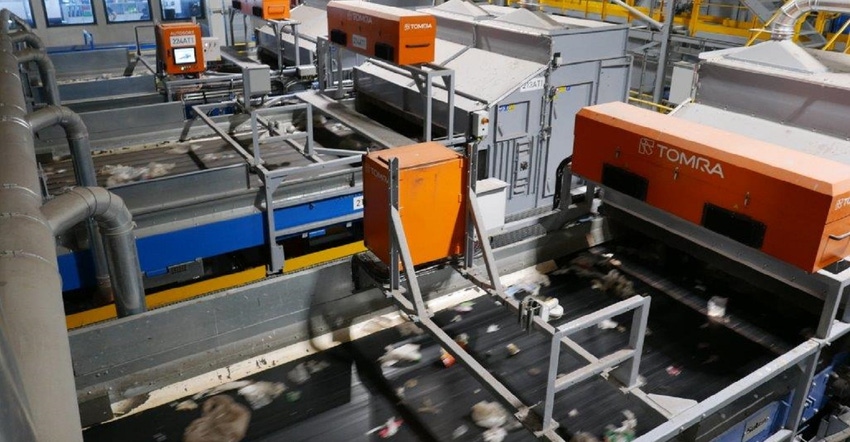TOMRA study – Holistic Resource Systems could save 3.04 billion tons (2.76 billion tonnes) of CO² annually
November 17, 2021

Sponsored Content
The United Nations Sustainable Development Goals (SDGs) of 2016 have been manifest by the European Commission: The new EU climate law increases the emission reduction target from 40% to at least 55% by 2030 to meet the expectations of the November World Climate Summit in Glasgow.
As an innovation leader, TOMRA aims to help achieve the goals and take waste management to another level. A new study commissioned by TOMRA and conducted by EUNOMIA demonstrates the potential for an optimized waste management system regarding climate change. Overall, a reduction of 3.04 billion tons (2.76 billion tonnes) of CO2/year is possible.
This reduction can be achieved using Holistic Resource Systems (HRS). HRS includes the optimized combination of key waste management practices for collection, sorting, and recycling to facilitate the transition toward a circular economy, which prevents resource depletion, reduces littering, and contributes to a carbon neutral world.
HRS offers an ideal combination of political framework regulations, such as extended producer responsibility, deposit return schemes, and technical processes for waste handling. London-based consultancy for sustainability Eunomia, has examined various models to identify the most efficient, cost-effective scenario for a holistic system.
The outcome for an efficient and cost-effective holistic system is clear:
Deposit return systems for PET bottles and metal beverage containers, which deliver a return rate of over 90%, should play a central role in such a system.
As regard to remaining household waste, only biowaste, paper, textiles, and electrical and electronic equipment should be collected separately.
The rest should remain in a mixed waste stream which can be most efficiently separated into reusable materials for further recycling.
This will enable regionally customized holistic models to cut global CO2 emissions by up to 5% - the equivalent of grounding all commercial flights globally and taking 65% of cars off the road.
“Now is the time for real action to ensure societies stop wasting resources with all the related negative consequences. In many places, the pandemic helped to meet Paris Climate Agreement goals,” underlines Volker Rehrmann, Executive Vice President and Head of TOMRA Recycling/Mining & Circular EconomyDivision. “But even maintaining this level will require determined and consistent implementation, including holistic systems, to close the loops.”
The three elements of holistic waste management are:
Deposit return schemes (DRS) for PET and metal beverage containers deliver a return rate of more than 90%. They maximize captures of high quality, high carbon-intensity material while reducing litter.
Separate collections of biowaste, paper, textiles, and electrical and electronic equipment (WEEE) enable these materials to be recycled for the greatest carbon benefit. Although separate collections are an intrinsic part of holistic resources, the capture rates in even best practices are not good enough. Further sorting of the residual waste fraction will always be necessary.
Mixed waste sorting (MWS) generates additional collection and recycling rates above and beyond what the other elements can deliver. The incineration or landfilling of plastics and other high carbon materials generate unnecessary greenhouse gas (GHG) emissions. MWS reduces those emissions and returns more materials to the system for incorporation into new products. MWS needs to be considered an investment priority now, as it is a required backstop to ensure waste management systems capture as many resources as possible for recycling.
Best practices in action
HRS: An exemplary model of the Holistic Resource Systems framework is in the region surrounding Stavanger, Norway. Before the analysis, the region offered a comprehensive system of separate collections for organic (food and garden) waste, paper, plastic packaging, glass, and textiles. The IVAR IKS system now processes all its residual municipal solid waste in one of the most advanced MSW plants in Europe. The result: a newly constructed, fully automated mixed waste sorting plant, including brand new facilities for plastics reprocessing and paper sorting.
IVAR IKS achieved significant improvements in the overall recycling rates, with plastics and metals recovery being most notable in reducing climate change emissions. The implemented system changes including mixed waste sorting has resulted in class leading recycling rates. As of 2021, the IVAR IKS ranks first in Norway in post-consumer plastic packaging collection rates.
Reverse Vending: In February 2016, the government of Lithuania implemented a DRS to give consumers an incentive to return used beverage containers for recycling. TOMRA supported Lithuania with the implementation of their new container deposit system, launched in February 2016 with a tight ramp-up timeframe. The roll-out represented the first time ever that TOMRA worked with a “throughput” model in Europe. The Lithuanian container deposit scheme has exceeded expectations, with 91.9% of all beverage containers returned for recycling by the end of 2017.
About TOMRA Circular Economy
TOMRA was founded on an innovation in 1972 that began with the design, manufacturing and sale of reverse vending machines (RVMs) for automated collection of used beverage containers. Today TOMRA provides technology-led solutions that enable the circular economy with advanced collection and sorting systems that optimize resource recovery and minimize waste in the food, recycling and mining industries and is committed to building a more sustainable future.
TOMRA has ~100,000 installations in over 80 markets worldwide and had total revenues of ~9.9 billion NOK in 2020. The Group employs ~4,300 globally and is publicly listed on the Oslo Stock Exchange (OSE: TOM).
For further information about TOMRA, please see www.tomra.com.
You May Also Like


